英国文学史 paraphrase Sonnet 18 解释
英诗名篇翻译——莎士比亚十四行诗sonnet18-2
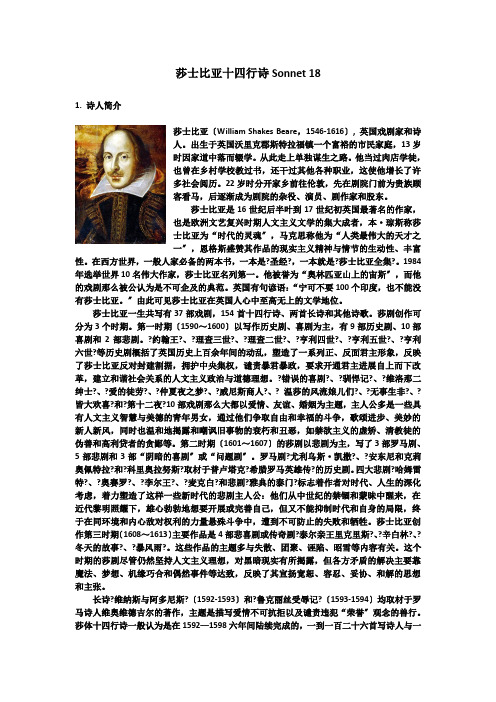
莎士比亚十四行诗Sonnet 181. 诗人简介莎士比亚〔William Shakes Beare,1546-1616〕, 英国戏剧家和诗人。
出生于英国沃里克郡斯特拉福镇一个富裕的市民家庭,13岁时因家道中落而辍学。
从此走上单独谋生之路。
他当过肉店学徒,也曾在乡村学校教过书,还干过其他各种职业,这使他增长了许多社会阅历。
22岁时分开家乡前往伦敦,先在剧院门前为贵族顾客看马,后逐渐成为剧院的杂役、演员、剧作家和股东。
莎士比亚是16世纪后半叶到17世纪初英国最著名的作家,也是欧洲文艺复兴时期人文主义文学的集大成者,本·琼斯称莎士比亚为“时代的灵魂〞,马克思称他为“人类最伟大的天才之一〞,恩格斯盛赞其作品的现实主义精神与情节的生动性、丰富性。
在西方世界,一般人家必备的两本书,一本是?圣经?,一本就是?莎士比亚全集?。
1984年选举世界10名伟大作家,莎士比亚名列第一。
他被誉为“奥林匹亚山上的宙斯〞,而他的戏剧那么被公认为是不可企及的典范。
英国有句谚语:“宁可不要100个印度,也不能没有莎士比亚。
〞由此可见莎士比亚在英国人心中至高无上的文学地位。
莎士比亚一生共写有37部戏剧,154首十四行诗、两首长诗和其他诗歌。
莎剧创作可分为3个时期。
第一时期〔1590~1600〕以写作历史剧、喜剧为主,有9部历史剧、10部喜剧和2部悲剧。
?约翰王?、?理查三世?、?理查二世?、?亨利四世?、?亨利五世?、?亨利六世?等历史剧概括了英国历史上百余年间的动乱,塑造了一系列正、反面君主形象,反映了莎士比亚反对封建割据,拥护中央集权,谴责暴君暴政,要求开通君主进展自上而下改革,建立和谐社会关系的人文主义政治与道德理想。
?错误的喜剧?、?驯悍记?、?维洛那二绅士?、?爱的徒劳?、?仲夏夜之梦?、?威尼斯商人?、? 温莎的风流娘儿们?、?无事生非?、?皆大欢喜?和?第十二夜?10部戏剧那么大都以爱情、友谊、婚姻为主题,主人公多是一些具有人文主义智慧与美德的青年男女,通过他们争取自由和幸福的斗争,歌颂进步、美妙的新人新风,同时也温和地揭露和嘲讽旧事物的衰朽和丑恶,如禁欲主义的虚矫、清教徒的伪善和高利贷者的贪鄙等。
十四行诗18英文赏析-莎士比亚[整理版]
![十四行诗18英文赏析-莎士比亚[整理版]](https://img.taocdn.com/s3/m/faf35c37bdd126fff705cc1755270722192e59c0.png)
莎士比亚的第18首十四行诗的英文赏析我能否将你比作夏天?你比夏天更美丽温婉。
狂风将五月的蓓蕾凋残,夏日的勾留何其短暂。
休恋那丽日当空,转眼会云雾迷蒙。
休叹那百花飘零,催折于无常的天命。
唯有你永恒的夏日常新,你的美貌亦毫发无损。
死神也无缘将你幽禁,你在我永恒的诗中长存。
只要世间尚有人吟诵我的诗篇,这诗就将不朽,永葆你的芳颜。
这首诗的艺术特点首先是在于它有着双重主题:一是赞美诗人爱友的美貌,二是歌颂了诗歌艺术的不朽力量。
其次就是诗人在诗中运用了新颖的比喻,但又自然而生动。
Sonnet 18, often alternately titled Shall I compare thee to a summer's day?, is one of the best-known of 154 sonnets written by the English playwright and poet William Shakespeare. Part of the Fair Y outh sequence (which comprises sonnets 1-126 in the accepted numbering stemming from the first edition in 1609), it is the first of the cycle after the opening sequence now described as the Procreation sonnets. Most scholars now agree that the original subject of the poem, the beloved to whom the poet is writing, is a male, though the poem is commonly used to describe a woman.In the sonnet, the poet compares his beloved to the summer season, and argues that his beloved is better. The poet also states that his beloved will live on forever through the words of the poem. Scholars have found parallels within the poem to Ovid's Tristia and Amores, both of which have love themes. Sonnet 18 is written in the typical Shakespearean sonnet form, having 14 lines of iambic pentameter ending in a rhymed couplet. Detailed exegeses have revealed several double meanings within the poem, giving it a greater depth of interpretation.Sonnet 18 is a typical English or Shakespearean sonnet. It consists of three quatrains followed by a couplet, and has the characteristic rhyme scheme: abab cdcd efef gg. The poem carries the meaning of an Italian or Petrarchan Sonnet. Petrarchan sonnets typically discussed the love and beauty of a beloved, often an unattainable love, but not always.[5] It also contains a volta, or shift in the poem's subject matter, beginning with the third quatrain.A facsimile of the original printing of Sonnet 18.The poem starts with a line of adoration to the beloved—"Shall I compare thee to a summer's day?" The speaker then goes on to say that the beloved being described is both "more lovely and more temperate" than a summer's day. Thespeaker lists some things that are negative about summer. It is too short—"summer's lease hath all too short a date"—and sometimes the sun shines too hot—"Sometime too hot the eye of heaven shines." However, the beloved being described has beauty that will last forever, unlike the fleeting beauty of a summer's day. By putting his love's beauty into the form of poetry, the poet is preserving it forever by the power of his written words. "So long as men can breathe, or eyes can see, So long lives this, and this gives life to thee." The hope is that the two lovers can live on, if not through children, then through the poems brought forth by their love which, unlike children, will not fadeA major feature of this poem - analogy. Begins with the first sentence, put "you" and "Summer" as a analogy, compare the second line of the initial determination: Are you more lovely than the summer, more gentle. The difference is due to produce its in-depth analysis of 3 to 14 lines. Specifically, the first line of 3.4.5.6.7.8 enumerated the "summer" all kinds of regrets, and 9.10.11.12.13.14 line tells the "you" all kinds of advantages compared to the natural draw a final conclusion: "Y ou" is far better than "Summer," "you" because in his poetry between the lines but also has a life, and time forever. Also noteworthy is the verse 13 and 14 are also, by analogy emphasized the "eternal nature."Throughout the poem, the poet freely to the "you" talk, it seems that "you" is a living person, to listen to his voice, understanding his thinking. So this poem can be said to be people in the application of techniques based on the written. The poem "Y ou" refers to an object, academia, there are two explanations, one view is that it refers to beauty, and the other that it refers to poetry to express the good things. Now most scholars prefer the latter.One of the best known of Shakespeare’s sonnets, Sonnet 18 is memorable for the skillful and varied presentation of subject matter, in which the poet’s feelings reach a level of rapture unseen in the previous sonnets. The poet here abandons his quest for the youth to have a child, and instead glories in the youth’s beauty.On the surface, the poem is simply a statement of praise about the beauty of the beloved; summer tends to unpleasant extremes of windiness and heat, but the beloved is always mild and temperate. Summer is incidentally personified as the "eye of heaven" with its "gold complexion"; the imagery throughout is simple and unaffected, with the "darling buds of May" giving way to the "eternal summer", which the speaker promises the beloved. The language, too, is comparatively unadorned for the sonnets; it is not heavy with alliteration or assonance, and nearly every line is its own self-contained clause--almost every line ends with some punctuation, which effects a pause.Initially, the poet poses a question―”Shall I compare thee to a summer’s day?”―and then reflects on it, remarking that the youth’s beauty far surpasses summer’s delights. The imagery is the very essence of simplic ity: “wind”and “buds.”In the fourth line, legal terminology―”summer’s lease”―is introduced in contrast to the commonplace images in the first three lines. Note also the poet’s use of extremes in the phrases “more lovely,”“all too short,”and “too hot”; these phrases emphasize the young man’s beauty.Although lines 9 through 12 are marked by a more expansive tone and deeper feeling, the poetreturns to the simplicity of the opening images. As one expects in Shakespeare’s sonnets, the proposition that the poet sets up in the first eight lines―that all nature is subject to imperfection―is now contrasted in these next four lines beginning with “But.”Although beauty naturally declines at some point―”And every fair from fair sometime declines”―the youth’s beauty will not; his unchanging appearance is atypical of nature’s steady progression. Even death is impotent against the youth’s beauty. Note the ambiguity in the phrase “eternal lines”: Are these “lines”the poet’s verses or the youth’s hoped-for children? Or are they simply wrinkles meant to represent the process of aging? Whatever the answer, the poet is jubilant in this sonnet because nothing threatens the young man’s beautiful appearance.Sonnet 18 is the first poem in the sonnets not to explicitly encourage the young man to have children. The "procreation" sequence of the first 17 sonnets ended with the speaker's realization that the young man might not need children to preserve his beauty; he could also live, the speaker writes at the end of Sonnet 17, "in my rhyme." Sonnet 18, then, is the first "rhyme"--the speaker's first attempt to preserve the young man's beauty for all time. An important theme of the sonnet (as it is an important theme throughout much of the sequence) is the power of the speaker's poem to defy time and last forever, carrying the beauty of the beloved down to future generations. The beloved's "eternal summer" shall not fade precisely because it is embodied in the sonnet: "So long as men can breathe or eyes can see," the speaker writes in the couplet, "So long lives this, and this gives life to thee."大多数莎学家认为,是作者赞美好友的超常之美的。
英国文学Sonnet 18 难词解析
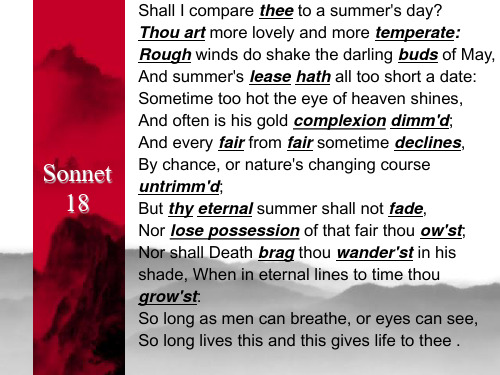
Thee [ði] ---You(宾格) 你 Thou [ðaʊ] ---You(主格)] 你,尔,汝 Thy [ðaɪ] ---Your 你的(thou的所有格) Art [ɑrt] ---Are Hath[hæθ] ---Has Ow’st---Own Wander’st---Wander Grow’st---Grow Dimm'd---Dimmed Untrimm'd---Untrimmed Examples: I shall but love thee better after death. 倘若上帝恩许,我死后将更加爱你。 Solve thou my secrets. 解答你我的秘密。
Translation
But thy eternal summer shall not fade, œ 你 久 决 会 枯, Nor lose possession of that fair thou ow'st; 你 远 会 去你 仪态; Nor shall Death brag thou wander'st in his shade, >!˛ 你 踯 , When in eternal lines to time thou grow'st: 你将 诗 与时间 ; So long as men can breathe, or eyes can see, YV 类 , 看 见, So long lives this and this gives life to thee . G 这诗 , 你 绵 。
Translation
让 来 你 拟 ? 你可 更加温 ,更加可爱: 狂风会 开 儿, 季 结 : 时 苍 巨 热, 脸 会 ; 样 ,总会 开 , 时机 谢 残; 你 久 决 会 枯, 你 远 会 去你 仪态; 你 踯 , 你将 诗 与时间 ; 类 , 看 见, 这诗 , 你 绵 。
莎士比亚十四行诗第18首汉译

莎士比亚十四行诗第18首汉译1,朱湘译文我来比你作夏天,好不好?不,你比它更可爱,更温和:暮春的娇花有暴风侵扰,夏住在人间的时日不多:有时候天之目亮得太凌人,他的金容常被云霾掩蔽,有时因了意外,四季周行,今天的美明天已不再美丽:你的永存之夏却不黄萎,你的美丽亦将长寿万年,你不会死,死神无从夸嘴,因为你的名字入了诗篇:一天还有人活着,有眼睛,你的名字便将于此常新。
2,李霁野译文我来将你比作夏天吗?你比夏天更为可爱,更为温和:暴风摇落五月的柔嫩花芽,夏季的租赁期限要短得多:有的时候太阳照得太热,他的金色面孔常变阴暗;每种美有时都会凋零衰谢,由于机缘,或者由于自然变幻;但是你的永久夏季不会衰败,你的美也永远不会丧失;死亡不至夸口:你在他的阴影里徘徊, 当你在不朽的诗行中度日:——只要人还能呼吸,眼睛还能看望,这些诗行就会永存,使你万寿无疆。
3,梁宗岱译文我怎么能够把你来比作夏天?你不独比它可爱也比它温婉:狂风把五月宠爱的嫩蕊作践,夏天出赁的期限又未免太短:天上的眼睛有时照得太酷烈,它那炳耀的金颜又常遭掩蔽:被机缘或无常的天道所摧折,没有芳艳不终于雕残或销毁。
但是你的长夏永远不会雕落,也不会损失你这皎洁的红芳,或死神夸口你在他影里漂泊,当你在不朽的诗里与时同长。
只要一天有人类,或人有眼睛,这诗将长存,并且赐给你生命。
4,梁实秋译文我可能把你和夏天相比拟?你比夏天更可爱更温和:狂风会把五月的花苞吹落地,夏天也嫌太短促,匆匆而过:有时太阳照得太热,常常又遮暗他的金色的脸;美的事物总不免要凋落,偶然的,或是随自然变化而流转。
但是你的永恒之夏不会褪色;你不会失去你的俊美的仪容;死神不能夸说你在他的阴影里面走着,如果你在这不朽的诗句里获得了永生;只要人们能呼吸,眼睛能看东西,此诗就会不朽,使你永久生存下去。
5,屠岸译文能不能让我把你比拟作夏日?你可是更加温和,更加可爱:狂风会吹落五月的好花儿,夏季的生命又未免结束得太快:有时候苍天的巨眼照得太灼热,他那金彩的脸色也会被遮暗;每一样美呀,总会离开美而凋落,被时机或者自然的代谢所摧残;但是你永久的夏天决不会凋枯,你永远不会失去你美的仪态;死神夸不着你在他影子里踯躅,你将在不朽的诗中与时间同在;只要人类在呼吸,眼睛看得见,我这诗就活着,使你的生命绵延。
莎士比亚十四行诗18分析

莎士比亚所处的英国伊莉莎白时代是爱情诗的盛世,写十四行诗更是一种时髦。
莎士比亚的十四行诗无疑是那个时代的佼佼者,其十四行诗集更是流传至今,魅力不减。
他的十四行诗一扫当时诗坛的矫柔造作、绮艳轻糜、空虚无力的风气。
据说,莎士比亚的十四行诗是献给两个人的:前126首献给一个贵族青年,后面的献给一个黑肤女郎。
这首诗是十四行诗集中的第18首,属前者。
也有人说,他的十四行诗是专业的文学创作。
当然,这些无关宏旨,诗歌本身是伟大的。
莎士比亚的十四行诗总体上表现了一个思想:爱征服一切。
他的诗充分肯定了人的价值、赞颂了人的尊严、个人的理性作用。
诗人将抽象的概念转化成具体的形象,用可感可见的物质世界,形象生动地阐释了人文主义的命题。
诗的开头将“你”和夏天相比较。
自然界的夏天正处在绿的世界中,万物繁茂地生长着,繁阴遮地,是自然界的生命最昌盛的时刻。
那醉人的绿与鲜艳的花一道,将夏天打扮得五彩缤纷、艳丽动人。
但是,“你”却比夏天可爱多了,比夏天还要温婉。
五月的狂风会作践那可爱的景色,夏天的期限太短,阳光酷热地照射在繁阴班驳的大地上,那熠熠生辉的美丽不免要在时间的流动中凋残。
这自然界最美的季节和“你”相比也要逊色不少。
而“你”能克服这些自然界的不足。
“你”在最灿烂的季节不会凋谢,甚至“你”美的任何东西都不会有所损失。
“你”是人世的永恒,“你”会让死神的黑影在遥远的地方停留,任由死神的夸口也不会死去。
“你”是什么?“你”与人类同在,你在时间的长河里不朽。
那人类精神的精华——诗,是你的形体吗?或者,你就是诗的精神,就是人类的灵魂。
诗歌在形式上一改传统的意大利十四行诗四四三三体,而是采用了四四四二体:在前面充分地发挥表达的层次,在充分的铺垫之后,用两句诗结束全诗,点明主题。
全诗用新颖巧妙的比喻,华美而恰当的修饰使人物形象鲜明、生气鲜活。
诗人用形象的表达使严谨的逻辑推理变得生动有趣、曲折跌宕,最终巧妙地得出了人文主义的结论。
The Author:William Shakespeare (/ˈʃeɪkspɪər/;26 April 1564 (baptised) –23 April 1616) was an English poet, playwright and actor, widely regarded as the greatest writer in the English language and the world'spre-eminent dramatist.He is often called England's national poet and the "Bard of Avon".His extant works, including some collaborations, consist of about 38 plays,154 sonnets, two long narrative poems, and a few other verses, the authorship of some of which is uncertain. His plays have been translated into every major living language and are performed more often than those of any other playwright.Shakespeare was born and brought up inStratford-upon-Avon. At the age of 18, he married Anne Hathaway, with whom he had three children: Susanna, and twins Hamnet and Judith. Between 1585 and 1592, he began a successful career in London as an actor, writer, and part-owner of a playing company called the Lord Chamberlain's Men, later known as the King's Men. He appears to have retired to Stratford around 1613 at age 49, where he died three years later. Few records of Shakespeare's private life survive, and there has been considerable speculation about such matters as his physical appearance, sexuality, religious beliefs, and whether the works attributed to him werewritten by others.Shakespeare produced most of his known work between 1589 and 1613.His early plays were mainly comedies and histories and these works remain regarded as some the best work produced in these genres even today. He then wrote mainly tragedies until about 1608, including Hamlet, King Lear, Othello, and Macbeth, considered some of the finest works in the English language. In his last phase, he wrote tragicomedies, also known as romances, and collaborated with other playwrights. Many of his plays were published in editions of varying quality and accuracy during his lifetime. In 1623, John Heminges and Henry Condell, two friends and fellow actors of Shakespeare, published the First Folio, a collected edition of his dramatic works that included all but two of the plays now recognised as Shakespeare's. It was prefaced with a poem by Ben Jonson, in which Shakespeare is hailed, presciently, as "not of an age, but for all time".Shakespeare was a respected poet and playwright in his own day, but his reputation did not rise to its present heights until the 19th century. The Romantics, in particular, acclaimed Shakespeare's genius, and the Victorians worshipped Shakespeare with a reverence that George Bernard Shaw called "bardolatry".[8] In the 20th century, his work was repeatedly adopted and rediscovered by new movements in scholarship and performance. His plays remain highly popular today and are constantly studied, performed, and reinterpreted in diverse cultural and political contexts throughout the world.It is not known exactly when Shakespeare began writing, but contemporary allusions and records of performances show that several of his plays were on the London stage by 1592.[30] By then, he was sufficiently well known in London to be attacked in print by the playwright Robert Greene in his Groats-Worth of Wit:...there is an upstart Crow, beautified with our feathers, that with his Tiger's heart wrapped in a Player's hide, supposes he is as well able to bombast out a blank verse as the best of you: and being an absolute Johannes factotum, is in his own conceit the only Shake-scene in a country.Scholars differ on the exact meaning of these words,but most agree that Greene is accusing Shakespeare of reaching above his rank in trying to matchuniversity-educated writers such as Christopher Marlowe, Thomas Nashe and Greene himself (the "university wits").The italicised phrase parodying the line "Oh, tiger's heart wrapped in a woman's hide" from Shakespeare's Henry VI, Part 3, along with the pun "Shake-scene", identifies Shakespeare as Greene's target. Here Johannes Factotum—"Jack of all trades"—means a second-rate tinkerer with the work of others, rather than the more common "universal genius". Greene's attack is the earliest surviving mention of Shakespeare's career in the theatre. Biographers suggest that his career may have begun any time from the mid-1580s to just before Greene's remarks.[35] From 1594, Shakespeare's plays were performed by only the Lord Chamberlain's Men, a company owned by a group of players, including Shakespeare, that soon became the leading playing company in London.[36] After the death of Queen Elizabeth in 1603, the company was awarded a royal patent by the new king, James I, and changed its name to the King's Men.[37]In 1599, a partnership of company members built their own theatre on the south bank of the River Thames, which they called the Globe. In 1608, the partnership also took over the Blackfriars indoor theatre. Records of Shakespeare's property purchases and investments indicate that the company made him a wealthy man.[38] In 1597, he bought the second-largest house in Stratford, New Place, and in 1605, he invested in a share of the parish tithes in Stratford.[39]Some of Shakespeare's plays were published in quarto editions from 1594. By 1598, his name had become a selling point and began to appear on thetitle pages.[40] Shakespeare continued to act in his own and other plays after his success as a playwright. The 1616 edition of Ben Jonson's Works names him on the cast lists for Every Man in His Humour (1598) and Sejanus His Fall (1603).[41] The absence of his name from the 1605 cast list for Jonson's Volpone is taken by some scholars as a sign that his acting career was nearing its end.[42] The First Folio of 1623, however, lists Shakespeare as one of "the Principal Actors in all these Plays", some of which were first staged after Volpone, although we cannot know for certain which roles he played.[43] In 1610, John Davies of Hereford wrote that "good Will" played "kingly" roles.[44] In 1709, Rowe passed down a tradition that Shakespeare played the ghost of Hamlet's father.[45] Later traditions maintain that he also played Adam in As You Like It and the Chorus in Henry V,[46] though scholars doubt the sources of the information.[47] Shakespeare divided his time between London and Stratford during his career. In 1596, the year before he bought New Place as his family home in Stratford, Shakespeare was living in the parish of St. Helen's,Bishopsgate, north of the River Thames.[48][49] He moved across the river to Southwark by 1599, the year his company constructed the Globe Theatrethere.[48][50] By 1604, he had moved north of the river again, to an area north of St Paul's Cathedral with many fine houses. There he rented rooms from a French Huguenot named Christopher Mountjoy, a maker of ladies' wigs and other headgear.[51]Later years and deathRowe was the first biographer to record the tradition, repeated by Johnson, that Shakespeare retired to Stratford 'some years before his death'.[52][53] He was still working as an actor in London in 1608; in an answer to the sharers' petition in 1635 Cuthbert Burbage stated that after purchasing the lease of the Blackfriars Theatre in 1608 from Henry Evans, the King's Men 'placed men players' there, 'which were Heminges, Condell, Shakespeare, etc.'.[54] However it is perhaps relevant that the bubonic plague raged in London throughout 1609.[55][56] The London public playhouses were repeatedly closed during extended outbreaks of the plague (a total of over 60 months closure between May 1603 and February 1610),[57] which meant there was often no acting work. Retirement from all work was uncommon at that time.[58] Shakespeare continued to visit London during the years 1611–1614.[52] In 1612, he was called as a witness in Bellott v. Mountjoy, a court case concerning the marriage settlement of Mountjoy's daughter, Mary.[59] In March 1613 he bought a gatehouse in the former Blackfriars priory;[60] and from November 1614 he was in London for several weeks with his son-in-law, John Hall.[61] After 1610, Shakespeare wrote fewer plays, and none are attributed to him after 1613.[62] His last three plays were collaborations, probably with John Fletcher,[63] who succeeded him as the house playwright for the King's Men.[64]Shakespeare died on 23 April 1616, at the age of 52.[65] He died within a month of signing his will, a document which he begins by describing himself as being in “perfect health”. There is no extant contemporary source that explains how or why he died. After half a century had passed, John Ward, the vicar of Stratford, wrote in his notebook: “Shakespeare, Drayton and Ben Jonson had a merry meeting and, it seems, drank too hard, for Shakespeare died of a fever therecontracted.”[66][67] This is not impossible, for Shakespeare knew Jonson and Drayton. Of the tributes that started to come from fellow authors, one refers to his relatively early death: “We wondered, Shakespeare, that thou went’st so soon/From the world’s stage to the grave’s tiring room.”[68]He was survived by his wife and two daughters. Susanna had married a physician, John Hall, in 1607,[69] and Judith had married Thomas Quiney, a vintner, two months before Shakespeare's death.[70] Shakespeare signed his last will and testament on 25 March 1616; the following day his new son-in-law, Thomas Quiney was found guilty of fathering an illegitimate son by Margaret Wheeler,who had died during childbirth. Thomas was ordered by the church court to do public penance which would have caused much shame and embarrassment for the Shakespeare family.In his will, Shakespeare left the bulk of his large estate to his elder daughter Susanna.[72] The terms instructed that she pass it down intact to "the first son of her body".[73] The Quineys had three children, all of whom died without marrying.[74] The Halls had one child, Elizabeth, who married twice but died without children in 1670, ending Shakespeare's direct line.[75] Shakespeare's will scarcely mentions his wife, Anne, who was probably entitled to one third of his estate automatically.[76] He did make a point, however, of leaving her "my second best bed", a bequest that has led to much speculation.[77] Some scholars see the bequest as an insult to Anne, whereas others believe that the second-best bed would have been the matrimonial bed and therefore rich in significance.Shakespeare was buried in the chancel of the Holy Trinity Church two days after his death.[79] The epitaph carved into the stone slab covering his grave includes a curse against moving his bones, which was carefully avoided during restoration of the church in 2008:[80]Shakespeare has been commemorated in many statues and memorials around the world, including funeral monuments in Southwark Cathedral and Poets' Corner in Westminster Abbey..。
莎士比亚十四行诗第十八首赏析

莎士比亚十四行诗第十八首赏析(总2页)--本页仅作为文档封面,使用时请直接删除即可----内页可以根据需求调整合适字体及大小--莎士比亚十四行诗第十八首赏析摘要:莎士比亚是英国文学史上泰斗级人物。
他创作的的154首十四行一向为时人推崇。
十四行诗达到了登峰造极的程度,成为英诗史上璀璨的明珠。
这理所要赏析的是莎翁十四行诗的第十八首,其热烈的情怀,精致的措辞和美妙的比喻,,不知令多少学者和诗人叹服,赏析文字者莫不称颂其妙。
关键词:莎士比亚十四行诗第18首诗人一开头就把他的爱友比作美好的“夏天”,其中“夏天”一词颇有争论,很多学者认为应该翻译成春天,但以我个人的观点,还是应该译成夏天。
因为英国的夏天相当于我国的春天或春末夏初,这是一年中最美好的季节,风和日暖,枝头绿叶冒新芽,百花含苞待开放,大地充满一派生机活力,迷人可爱。
开篇第一句便直入主题,用一问一答得方式毫不含蓄的点名她的美。
虽然夏天如此美丽,但仍然不及她之美。
作者意不在提出疑问,而是通过疑问句,引出第二句肯定的回答,恰如其分地达到赞赏的目的,诗人如此煞费,说明她的美丽不仅令他赞赏,而且还令他崇敬。
这比开篇便用一陈述句更有说服力。
接着第3456句,诗人进一步解释为什么“你比它可爱也比它温婉”,那是因为“狂风”会把“五月的嫩芽摧残”,“夏天的期限”太过于短暂,阳光过于“强烈”,有时却也会被“遮掩”。
这一系列的意象,为我们勾勒出一副副夏景图,引人遐想。
其中不难看出,作者对这一副副图景产生的是一种怜惜之情,这时让我们不禁思考,那诗人对她的怜爱,该有多么深沉。
后接着的两句:“世上娇艳之物都会凋零,受机缘或大自然的局限”,为我们阐释这样一个哲理:世界上所有美丽的事物都会有遵循着大自然的规律,随着时间的流逝而消失。
这虽为一个众所周知的事实,却令古今多少文人墨客所感叹。
接着,诗人用一个转折,说“你的长夏永远不会消逝,永不会失去迷人的光彩;不会在死神阴影中漂泊”这的用暗喻的手法,将她的美丽比作“长夏”,意为有夏天的美丽,而且比夏天更长,有取夏天之长,补夏天之短的意味。
莎士比亚文集sonnet18
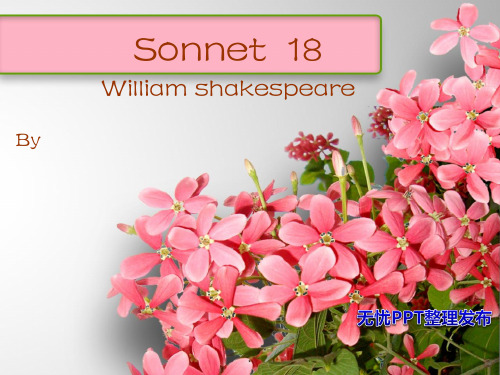
Sometime too hot the eye of heaven shines, 休恋那丽日当空, And often is his gold complexion dimm'd, 转眼会云雾迷蒙。 And every fair from fair sometime declines , 休叹那百花飘零, By chance or nature‘s changing course, untrimm’d: 催折于无常的天命。
Rough winds do shake the darling buds of May, And summer's lease hath all too short a date. Sometime too hot the eye of heaven shines, And often is his gold complexion dimm'd, And every fair from fair sometime declines , By chance or nature‘s changing course , untrimm’d:
Analogy 类比
It is also a form of comparison, but unlike sim ile or metaphor which usually uses compariso n on one point of resemblance, analogy draw s a parallel between two unlike things that ha ve several common qualities or points of rese mblance.
Sonnet 18
William shakespeare
莎士比亚十四行诗第十八首
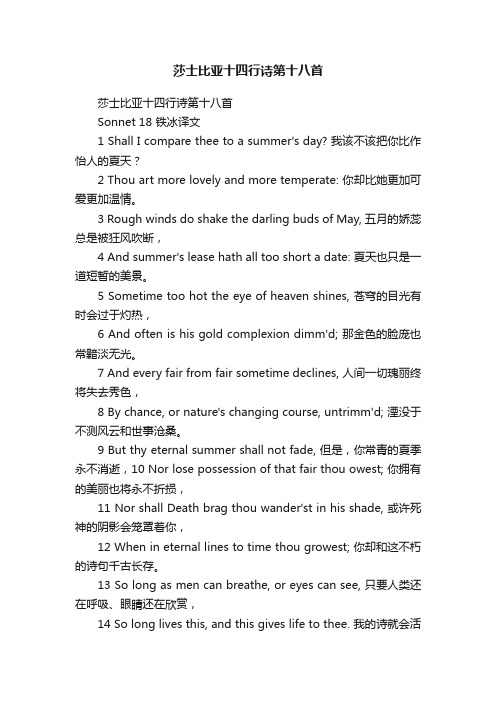
莎士比亚十四行诗第十八首莎士比亚十四行诗第十八首Sonnet 18 铁冰译文1 Shall I compare thee to a summer's day? 我该不该把你比作怡人的夏天?2 Thou art more lovely and more temperate: 你却比她更加可爱更加温情。
3 Rough winds do shake the darling buds of May, 五月的娇蕊总是被狂风吹断,4 And summer's lease hath all too short a date: 夏天也只是一道短暂的美景。
5 Sometime too hot the eye of heaven shines, 苍穹的目光有时会过于灼热,6 And often is his gold complexion dimm'd; 那金色的脸庞也常黯淡无光。
7 And every fair from fair sometime declines, 人间一切瑰丽终将失去秀色,8 By chance, or nature's changing course, untrimm'd; 湮没于不测风云和世事沧桑。
9 But thy eternal summer shall not fade, 但是,你常青的夏季永不消逝,10 Nor lose possession of that fair thou owest; 你拥有的美丽也将永不折损,11 Nor shall Death brag thou wander'st in his shade, 或许死神的阴影会笼罩着你,12 When in eternal lines to time thou growest; 你却和这不朽的诗句千古长存。
13 So long as men can breathe, or eyes can see, 只要人类还在呼吸、眼睛还在欣赏,14 So long lives this, and this gives life to thee. 我的诗就会活着,令你生命绽放。
十四行诗18英文赏析-莎士比亚

莎士比亚的第18首十四行诗的英文赏析我能否将你比作夏天?你比夏天更美丽温婉。
狂风将五月的蓓蕾凋残,夏日的勾留何其短暂。
休恋那丽日当空,转眼会云雾迷蒙。
休叹那百花飘零,催折于无常的天命。
唯有你永恒的夏日常新,你的美貌亦毫发无损。
死神也无缘将你幽禁,你在我永恒的诗中长存。
只要世间尚有人吟诵我的诗篇,这诗就将不朽,永葆你的芳颜。
这首诗的艺术特点首先是在于它有着双重主题:一是赞美诗人爱友的美貌,二是歌颂了诗歌艺术的不朽力量。
其次就是诗人在诗中运用了新颖的比喻,但又自然而生动。
Sonnet 18, often alternately titled Shall I compare thee to a summer's day?, is one of the best-known of 154 sonnets written by the English playwright and poet William Shakespeare. Part of the Fair Youth sequence (which comprises sonnets 1-126 in the accepted numbering stemming from the first edition in 1609), it is the first of the cycle after the opening sequence now described as the Procreation sonnets. Most scholars now agree that the original subject of the poem, the beloved to whom the poet is writing, is a male, though the poem is commonly used to describe a woman.In the sonnet, the poet compares his beloved to the summer season, and argues that his beloved is better. The poet also states that his beloved will live on forever through the words of the poem. Scholars have found parallels within the poem to Ovid's Tristia and Amores, both of which have love themes. Sonnet 18 is written in the typical Shakespearean sonnet form, having 14 lines of iambic pentameter ending in a rhymed couplet. Detailed exegeses have revealed several double meanings within the poem, giving it a greater depth of interpretation.Sonnet 18 is a typical English or Shakespearean sonnet. It consists of three quatrains followed by a couplet, and has the characteristic rhyme scheme: abab cdcd efef gg. The poem carries the meaning of an Italian or Petrarchan Sonnet. Petrarchan sonnets typically discussed the love and beauty of a beloved, often an unattainable love, but not always.[5] It also contains a volta, or shift in the poem's subject matter, beginning with the third quatrain.A facsimile of the original printing of Sonnet 18.The poem starts with a line of adoration to the beloved—"Shall I compare thee to a summer's day?" The speaker then goes on to say that the beloved being described is both "more lovely and more temperate" than a summer's day. The speaker lists some things that are negative about summer. It is too short—"summer's lease hath alltoo short a date"—and sometimes the sun shines too hot—"Sometime too hot the eye of heaven shines." However, the beloved being described has beauty that will last forever, unlike the fleeting beauty of a summer's day. By putting his love's beauty into the form of poetry, the poet is preserving it forever by the power of his written words. "So long as men can breathe, or eyes can see, So long lives this, and this gives life to thee." The hope is that the two lovers can live on, if not through children, then through the poems brought forth by their love which, unlike children, will not fadeA major feature of this poem - analogy. Begins with the first sentence, put "you" and "Summer" as a analogy, compare the second line of the initial determination: Are you more lovely than the summer, more gentle. The difference is due to produce its in-depth analysis of 3 to 14 lines. Specifically, the first line of 3.4.5.6.7.8 enumerated the "summer" all kinds of regrets, and 9.10.11.12.13.14 line tells the "you" all kinds of advantages compared to the natural draw a final conclusion: "You" is far better than "Summer," "you" because in his poetry between the lines but also has a life, and time forever. Also noteworthy is the verse 13 and 14 are also, by analogy emphasized the "eternal nature."Throughout the poem, the poet freely to the "you" talk, it seems that "you" is a living person, to listen to his voice, understanding his thinking. So this poem can be said to be people in the application of techniques based on the written. The poem "You" refers to an object, academia, there are two explanations, one view is that it refers to beauty, and the other that it refers to poetry to express the good things. Now most scholars prefer the latter.One of the best known of Shakespeare’s sonnets, Sonnet 18 is memorable for the skillful and varied presentation of subject matter, in which the poet’s feelings reach a level of rapture unseen in the previous sonnets. The poet here abandons his quest for the youth to have a child, and instead glories in the youth’s beauty.On the surface, the poem is simply a statement of praise about the beauty of the beloved; summer tends to unpleasant extremes of windiness and heat, but the beloved is always mild and temperate. Summer is incidentally personified as the "eye of heaven" with its "gold complexion"; the imagery throughout is simple and unaffected, with the "darling buds of May" giving way to the "eternal summer", which the speaker promises the beloved. The language, too, is comparatively unadorned for the sonnets; it is not heavy with alliteration or assonance, and nearly every line is its own self-contained clause--almost every line ends with some punctuation, which effects a pause. Initially, the poet poses a question―”Shall I compare thee to a summer’s day?”―and then reflects on it, remarking that the youth’s beauty far surpasses summer’s delights. The imagery is the very essence of simplicity: “wind”and “buds.”In the fourth line, legal terminology―”summer’s lease”―is introduced in contrast to the commonplace images in the first three lines. Note also the poet’s use of extremes in the phrases “more lovely,”“all too short,”and “too hot”; these phrases emphasize the young man’s beauty.Although lines 9 through 12 are marked by a more expansive tone and deeper feeling, the poet returns to the simplicity of the opening images. As one expects in Shakespeare’s sonnets, the proposition that the poet sets up in the first eight lines―that all nature is subject to imperfection―is now contrasted in these next four lines beginning with “But.”Although beauty naturally declines at some point―”And every fair from fair sometime declines”―the youth’s beauty will not; his unchanging appearance is atypical of nature’s steady progression. Even death is impotent against the youth’s beauty. Note the ambiguity in the phrase “eternal lines”: Are these “lines”the poet’s verses or the youth’s hoped-for children? Or are they simply wrinkles meant to represent the process of aging? Whatever the answer, the poet is jubilant in this sonnet because nothing threatens the young man’s beautiful appearance.Sonnet 18 is the first poem in the sonnets not to explicitly encourage the young man to have children. The "procreation" sequence of the first 17 sonnets ended with the speaker's realization that the young man might not need children to preserve his beauty; he could also live, the speaker writes at the end of Sonnet 17, "in my rhyme." Sonnet 18, then, is the first "rhyme"--the speaker's first attempt to preserve the young man's beauty for all time. An important theme of the sonnet (as it is an important theme throughout much of the sequence) is the power of the speaker's poem to defy time and last forever, carrying the beauty of the beloved down to future generations. The beloved's "eternal summer" shall not fade precisely because it is embodied in the sonnet: "So long as men can breathe or eyes can see," the speaker writes in the couplet, "So long lives this, and this gives life to thee."大多数莎学家认为,是作者赞美好友的超常之美的。
Sonnet_18(英文赏析)

Sonnet 18By William ShakespeareShall I compare thee to a summer’s day?Thou art more lovely and more temperate: Rough winds do shake the darling buds of May, And summer’s lease hath all too short a date: Sometimes too hot the eye of heaven shinesAnd often is his gold complexion dimed;And every fair form fair sometimes declines,By chance or nature’s changing course untrimmed; But thy eternal summer shall not fade,Nor lose possession of that fair thou ow’st;Nor shall death brag thou wander’st in his shade. When in eternal lines to time thou grow’st:So long as men can breathe,or eyes can see,So long lives this,and this gives life to thee.十四行诗(其十八)威廉·莎士比亚我能把你比作夏日吗?尽管你更可爱、更温和;夏日的狂风可能会摧残五月的花儿,季节的限制又减少了可拥有的日光;天空的巨眼有时过于灼热,常使自身的辉煌无故湮没;每一种美都会消逝,不管愿意或是无奈;然而你这盛夏将永存不朽,连你所有的美都不会褪去;死神不忍逼近,生命只会长存;只要人类能呼吸,能看见;我的诗就会存在,而你的生命也会延续。
sonnet18诗歌解析
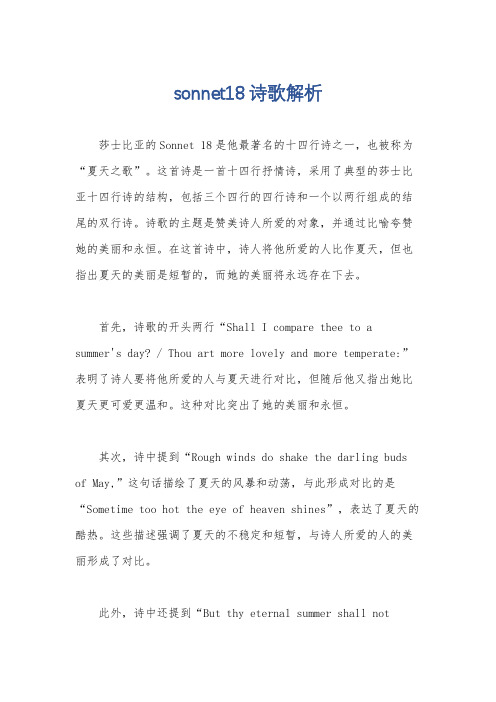
sonnet18诗歌解析莎士比亚的Sonnet 18是他最著名的十四行诗之一,也被称为“夏天之歌”。
这首诗是一首十四行抒情诗,采用了典型的莎士比亚十四行诗的结构,包括三个四行的四行诗和一个以两行组成的结尾的双行诗。
诗歌的主题是赞美诗人所爱的对象,并通过比喻夸赞她的美丽和永恒。
在这首诗中,诗人将他所爱的人比作夏天,但也指出夏天的美丽是短暂的,而她的美丽将永远存在下去。
首先,诗歌的开头两行“Shall I compare thee to a summer's day? / Thou art more lovely and more temperate:”表明了诗人要将他所爱的人与夏天进行对比,但随后他又指出她比夏天更可爱更温和。
这种对比突出了她的美丽和永恒。
其次,诗中提到“Rough winds do shake the darling buds of May,”这句话描绘了夏天的风暴和动荡,与此形成对比的是“Sometime too hot the eye of heaven shines”,表达了夏天的酷热。
这些描述强调了夏天的不稳定和短暂,与诗人所爱的人的美丽形成了对比。
此外,诗中还提到“But thy eternal summer shall notfade”,这句话表达了诗人对所爱人美丽永恒的信念,即使时间流逝,她的美丽也不会凋谢。
最后,诗歌的结尾两行“So long as men can breathe oreyes can see, / So long lives this, and this gives life to thee.”表达了诗人的信念,即只要人类存在,这首诗也将永存下去,而她的美丽也将因此而得以永生。
总的来说,Sonnet 18是一首赞美之歌,通过对比夏天的短暂和变化与所爱人的永恒美丽,表达了诗人对所爱人的赞美和珍视之情。
这首诗以其优美的语言和深刻的意境,成为了莎士比亚诗歌中的经典之作。
十四行诗之十八译文
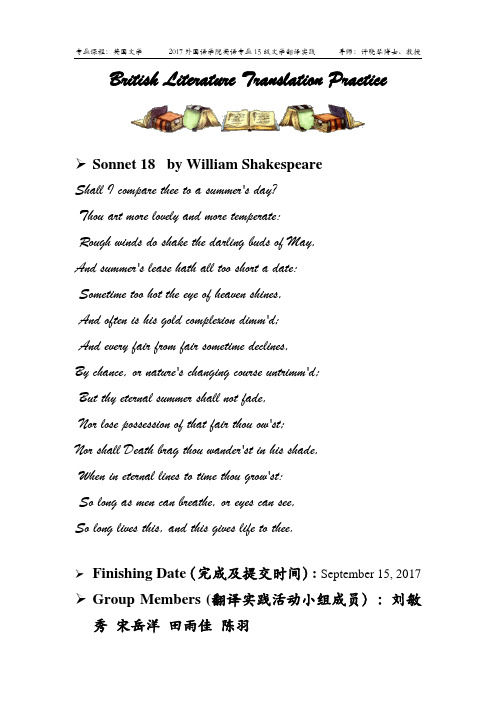
Sonnet 18 by William ShakespeareShall I compare thee to a summer's day?Thou art more lovely and more temperate:Rough winds do shake the darling buds of May,And summer's lease hath all too short a date:Sometime too hot the eye of heaven shines,And often is his gold complexion dimm'd;And every fair from fair sometime declines,By chance, or nature's changing course untrimm'd;But thy eternal summer shall not fade,Nor lose possession of that fair thou ow'st;Nor shall Death brag thou wander'st in his shade,When in eternal lines to time thou grow'st:So long as men can breathe, or eyes can see,So long lives this, and this gives life to thee.Finishing Date(完成及提交时间): September 15, 2017 Group Members (翻译实践活动小组成员):刘敏秀宋岳洋田雨佳陈羽Chinese Translation(译文)这夏,真的可以与你媲美吗?你时而迷人,时而温婉。
刚风落了五月的初蕾,夏日的生命未免太短。
莎士比亚-sonnet-18-29-66的中文翻译及评析
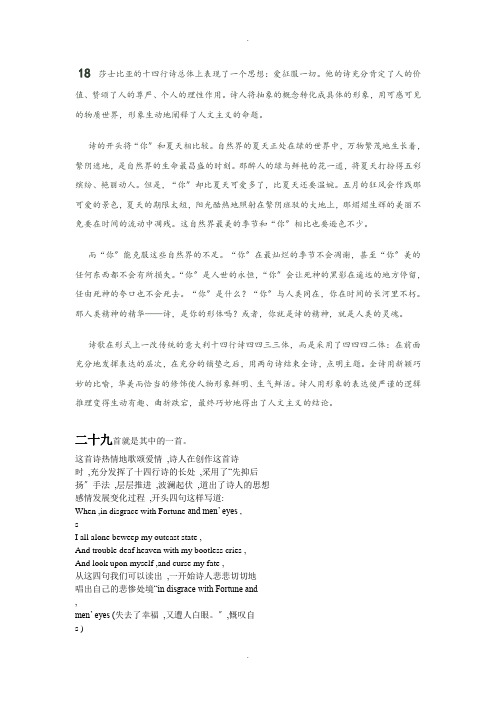
18莎士比亚的十四行诗总体上表现了一个思想:爱征服一切。
他的诗充分肯定了人的价值、赞颂了人的尊严、个人的理性作用。
诗人将抽象的概念转化成具体的形象,用可感可见的物质世界,形象生动地阐释了人文主义的命题。
诗的开头将“你〞和夏天相比较。
自然界的夏天正处在绿的世界中,万物繁茂地生长着,繁阴遮地,是自然界的生命最昌盛的时刻。
那醉人的绿与鲜艳的花一道,将夏天打扮得五彩缤纷、艳丽动人。
但是,“你〞却比夏天可爱多了,比夏天还要温婉。
五月的狂风会作践那可爱的景色,夏天的期限太短,阳光酷热地照射在繁阴班驳的大地上,那熠熠生辉的美丽不免要在时间的流动中凋残。
这自然界最美的季节和“你〞相比也要逊色不少。
而“你〞能克服这些自然界的不足。
“你〞在最灿烂的季节不会凋谢,甚至“你〞美的任何东西都不会有所损失。
“你〞是人世的永恒,“你〞会让死神的黑影在遥远的地方停留,任由死神的夸口也不会死去。
“你〞是什么?“你〞与人类同在,你在时间的长河里不朽。
那人类精神的精华——诗,是你的形体吗?或者,你就是诗的精神,就是人类的灵魂。
诗歌在形式上一改传统的意大利十四行诗四四三三体,而是采用了四四四二体:在前面充分地发挥表达的层次,在充分的铺垫之后,用两句诗结束全诗,点明主题。
全诗用新颖巧妙的比喻,华美而恰当的修饰使人物形象鲜明、生气鲜活。
诗人用形象的表达使严谨的逻辑推理变得生动有趣、曲折跌宕,最终巧妙地得出了人文主义的结论。
二十九首就是其中的一首。
这首诗热情地歌颂爱情,诗人在创作这首诗时,充分发挥了十四行诗的长处,采用了“先抑后扬〞手法,层层推进,波澜起伏,道出了诗人的思想感情发展变化过程,开头四句这样写道:When ,in disgrace with Fortune and men’ eyes ,sI all alone beweep my outcast state ,And trouble deaf heaven with my bootless cries ,And look upon myself ,and curse my fate ,从这四句我们可以读出,一开始诗人悲悲切切地唱出自己的悲惨处境“in disgrace with Fortune and,men’ eyes (失去了幸福,又遭人白眼。
诗歌翻译中人际意义的建构——评莎士比亚sonnet18的翻译

诗歌翻译中人际意义的建构——评莎士比亚sonnet18的
翻译
莎士比亚的十四行诗18首,也被称为"夏天之歌",描述了一个美丽
而永恒的爱情。
下面是该诗的中文翻译(版本较多,以下为其中之一):那图画的话筒遥远的声音尽美
夏天之中重新出现了
暴风雨之后的世界更加绿油油
宝藏的喧嚣抵不上你永恒光芒。
有些人会褪色,另有些人会消散
些微差异分隔他们的立场
但你的美丽不会永远消磨
只要人类还存在,你将活在这世界上。
只要人们还能读这首诗
和眼睛能看见诗中的真谛
这样你将永远在我的诗里
永远年轻,永远美丽。
直到审判日降临
这首诗会赋予你永恒的生命。
这个翻译试图表达出原诗中人际意义的建构以及诗中表达的独特之美。
总体而言,这个翻译对原诗的意思和情感有较好的表达,能够让读者领会
到莎士比亚笔下的美丽与深情。
然而,不同的翻译版本可能会有所不同,读者可以根据自己的理解和审美偏好选择适合自己的翻译。
Sonnet18及赏析
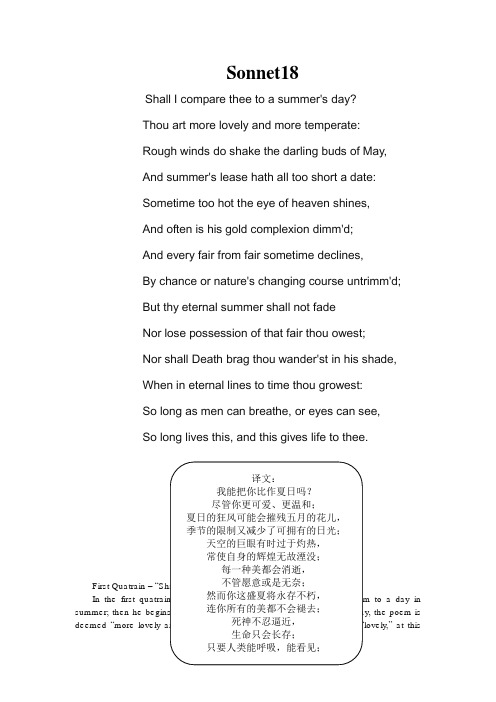
Sonnet18Shall I compare thee to a summer's day?Thou art more lovely and more temperate: Rough winds do shake the darling buds of May, And summer's lease hath all too short a date: Sometime too hot the eye of heaven shines,And often is his gold complexion dimm'd;And every fair from fair sometime declines,By chance or nature's changing course untrimm'd; But thy eternal summer shall not fadeNor lose possession of that fair thou owest;Nor shall Death brag thou wander'st in his shade, When in eternal lines to time thou growest:So long as men can breathe, or eyes can see,So long lives this, and this gives life to thee.point, seems to be just the speaker’s opinion, but to prove the poem more temperate, he explains, “Rough winds do shake the darling buds of May”: the “rough winds” that blow the young buds of flowers about is certainly not mild or temperate. And also summer just does not last very long; it has “all too short a date.”The poem, when compared to a summer’s day, is better; its beauty and mildness do not end as summer along with its “summer’s day”does. The reader wonder why the speaker, just after claiming his intention of comparing the poem to a “summer’s day,” then first compares it to a spring day—“the darling buds of May.”Even before summer begins, the May flowers are being tossed about by intemperate breezes; therefore, it stands to reason that if the prelude to summer has its difficulties, one can expect summer have its own unique problems that the poem, of course, will lack.Second Quatrain –“Sometime too hot the eye of heaven shines”In the second quatrain, the speaker continues elucidating his complaints that diminish summer’s value in this comparison: sometimes the sunshine makes the temperature too hot: “Sometime too hot the eye of heaven shines.” The sun often hides behind clouds, “often is his gold complexion dimm’d.” The reader can realize the implications here: that these inconvenient qualities do no plague the poem.Then the speaker makes a generalization that everything in nature including the seasons—and he has chosen the best season, after all; he did not advantage his argument by comparing the poem to a winter day—and even people degenerates with time, either by happenstance or by processes the human mind does not comprehend or simply by the unstoppable course of nature: "And every fair from fair sometime declines, / By chance, or nature’s changing course untrimm’d.”So far, the speaker has mused that he shall compare the poem to a summer day, and the summer day is losing: even before summer begins, the winds of May are often brutal to the young flowers; summer never lasts long; sometimes the sun is too hot and sometimes it hides behind clouds, and besides everything—even the good things—in nature diminishes in time.Third Quatrain –“But thy eternal summer shall not fade”In the third quatrain, the speaker declares the advantages that the poem has over the summer day: that unlike the summer day, the poem shall remain eternally; its summer will not end as the natural summer day must. Nor will the poem lose its beauty, and even death cannot claim the poem, because it will exist “in eternal lines”that the poet will continue to write, “When in eternal lines to time thou grow’st.”The Couplet –“This gives life to thee”The couplet—“So long as men can breathe, or eyes can see, / So long lives this, and this gives life to thee”—claims that as long as someone is alive to read it, the poem will have life.。
sonnet 18 的逐句解析

Sonnet 18原文1: Shall I compare thee to a summer’s day?释义1: Can I compare you to a summer’s day? In England, summer is the best season of a year, because summer brings warmer and sunnier weather compared to the other seasons. This change in climate allows people to spend more time outdoors, enjoy outdoor activities, and experience longer daylight hours.原文2: Thou art more lovely and more temperate.释义2: “More lovely” means that “you” are more beautiful or attractive. “More temperate” suggests that “you” possesses a more moderate and balanced temperament or nature.原文3: Rough winds do shake the darling buds of May.释义3:⚫“Rough winds” refers to strong or harsh winds, highlighting the forceful nature of the weather. ⚫“Do shake” indicates that the rough winds are causing a shaking or disturbance.⚫“The darling buds of May” refers to the delicate and beloved flower buds that bloom in the month of May.It symbolizes the beauty and potential of nature. this line portrays the vulnerability and fragility of nature. It suggests that even the most cherished and delicate aspects of life, represented by the tender flower buds of May, are not immune to the turbulent forces of the world, here represented by the rough winds.原文4: And Summer’s lease hath all too short a date释义4:⚫“And Summer’s lease” refers to the limited time or duration of summer.⚫“Lease” here can be understood as a leasehold or a period of time.⚫“Hath all too short a date” means that the time allocated to summer is considered too brief or insufficient. this line expresses the speaker’s sadness about the fleeting nature of summer.It reflects the common experience of longing for the summer season to last longer, as the warmth, beauty, and enjoyment associated with summer are cherished but inherently temporary.原文5: Sometime too hot the eye of heaven shines,释义5: the eye of heaven here refers to the sun, and Shakespeare suggests that sometimes the sun shines too intensely or with excessive heat. In Shakespearean sonnets, the “eye of heaven” is often associated with beauty, light, and divine power. By suggesting that the eye of heaven shines too hot, the speaker could be expressing the idea that even the most beautiful and powerful things can sometimes be overwhelming or excessive.原文6: And often is his gold complexion dimm’d:释义6: In this line, Shakespeare continues to describe the sun and its changing appearance, the phrase “his gold complexion” refers to the sun’s radiant and golden appearance. The word “dimm’d” suggests that the sun’s brightness or brilliance is frequently diminished because of the clouds. Connected with the previous line, Shakespeare tries to point out that the sun is sometimes too hot,too shiny, sometimes be covered by clouds or diminished in time.原文7: And every fair from fair sometime declines释义7: The word “fair” here refers to anything that is beautiful or lovely. This line suggest that everything beautiful eventually loses its beauty or fades away, all the beautiful things will eventually decline or deteriorate over time.原文8: By chance, or nature’s changing course untrimm’d;释义8: The phrase “by chance” refers to the possibility that beauty may fade away unexpectedly, without any specific reason or cause. The expression “nature’s changing course untrimm’d” indicates that the fading of beauty is a natural and inevitable process. It emphasizes the idea that even nature itself, with its constant cycles and changes, does not intervene or alter this course. The word “untrimm’d” suggests that beauty is not preserved or maintained, but is subject to the natural order of things.原文9: But thy eternal summer shall not fade,释义9: Your beauty will not fade away or lose brightness, your beauty will always be remembered no mater how the nature’s course changed.原文10: Nor lose possession of that fair thou ow’st,释义10: You will never lose your inherent beauty or the qualities that make you attractive. It suggests that your beauty is a part of who you are and will always belong to you.原文11: Nor shall death brag thou wander’st in his shade,释义11: Even death will not be able to claim or overshadow the person’s beauty原文12: When in eternal lines to time thou grow’st;释义12: “eternal lines” here refers to this sonnet, you will grow in these lines, this sonnet, I will immortalize your beauty.原文13: So long as men can breathe or eyes can see,原文14: So long lives this, and this gives life to thee.释义: As long as men are alive and able to see, this poem will continue to exist and will give life to you, in this sonnet, Shakespeare is expressing the timeless nature of his poetry. He claims that as long as humanity exists and can appreciate beauty, his words will endure, immortalizing the subject of the poem and preserving their memory。
赏析莎士比亚十四行诗第十八首

硕士论坛
2010.02
学教育
And sum/mer's lease/ hath all/ too short/ a date:
Sometime/ too hot/ the eye /of hea/ven shines,
And often/ is his /gold com/plxion dimm'd; And eve/ry fair /from fair/ sometime /de- clines, By chance,/ or na/ture's chan/ging course,/ untrimm'd; But thy/ eter/nal sum/mer shall/ not fade, Nor lose/ posses/sion of /that fair/ thou ow'st; Nor shall/ Death brag /thou wan/der’ st in/ his shade, When in/ eter/nal lines/ to time/ thou growest; So long/ as men /can breathe/, or eyes /can see, So long/ lives this/, and this /gives life/ to thee. 中文译作②如下: 能不能让我来把你比作夏日? 你可是更加可爱,更加温婉; 狂风会吹落五月里开的好花儿, 夏季租出的日子又未免太短暂: 有时候苍天的巨眼照得太灼热, 他那金彩的脸色也会被遮暗; 每一样美呀,总会离开美而凋落, 被时机或者自然的代谢所摧残; 但是你永久的夏天决不会凋枯, 你永远不会失去你美的形相: 死神夸不着你在他影子里踯躅, 你将在不朽的诗中与时间同长; 只要人类在呼吸,眼睛看得见, 我这诗就活着,使你的生命绵延。(屠岸 译) 这首诗的格律是抑扬格五音步。每行有十个音 节 (五个音步,诗中用/划分),从诗歌结尾的双偶 句来看,多数音步的第一个音节弱读,第二个音节 重读 (重读音节用下划线标注),称为抑扬格,其韵 式为abab cdcd efef gg,如每行的结尾“day-may”、 “ temperate- date”、“shines- declines”、“ dimm'd- untrimm'd”、 “ fade- shade”、 “ ow'st- grow'st” 和 “see- thee”都构成押韵。这种格局犹如轻重相间婉 转动听的音律,给听觉带来艺术享受,犹如潺潺之 流水,有轻有重,有缓有急,曲折跌宕,节奏富于 变化。最后两行诗自成一体,是一个双偶句 (两句 押韵的抑扬格五音步诗行),用来点明全诗的主题, 是全诗点睛之笔,又自成一联警语格言。那么,对 诗人而言,诗的结构越严谨,就越难抒情,而诗人 自由奔放、热烈真挚的感情却在诗歌中娓娓道出,
英国文学史paraphraseSonnet18解释
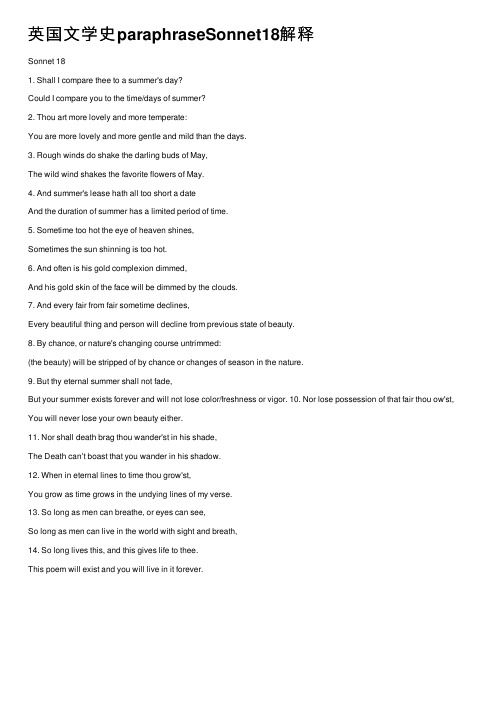
英国⽂学史paraphraseSonnet18解释Sonnet 181. Shall I compare thee to a summer's day?Could I compare you to the time/days of summer?2. Thou art more lovely and more temperate:You are more lovely and more gentle and mild than the days.3. Rough winds do shake the darling buds of May,The wild wind shakes the favorite flowers of May.4. And summer's lease hath all too short a dateAnd the duration of summer has a limited period of time.5. Sometime too hot the eye of heaven shines,Sometimes the sun shinning is too hot.6. And often is his gold complexion dimmed,And his gold skin of the face will be dimmed by the clouds.7. And every fair from fair sometime declines,Every beautiful thing and person will decline from previous state of beauty.8. By chance, or nature's changing course untrimmed:(the beauty) will be stripped of by chance or changes of season in the nature.9. But thy eternal summer shall not fade,But your summer exists forever and will not lose color/freshness or vigor. 10. Nor lose possession of that fair thou ow'st, You will never lose your own beauty either.11. Nor shall death brag thou wander'st in his shade,The Death can’t boast that you wander in his shadow.12. When in eternal lines to time thou grow'st,You grow as time grows in the undying lines of my verse.13. So long as men can breathe, or eyes can see,So long as men can live in the world with sight and breath,14. So long lives this, and this gives life to thee.This poem will exist and you will live in it forever.。
Sonnet 18-1
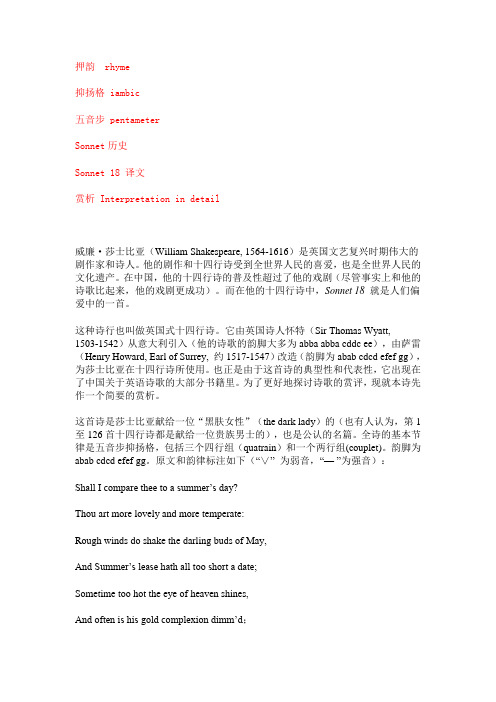
押韵 rhyme抑扬格 iambic五音步 pentameterSonnet历史Sonnet 18 译文赏析 Interpretation in detail威廉·莎士比亚(William Shakespeare, 1564-1616)是英国文艺复兴时期伟大的剧作家和诗人。
他的剧作和十四行诗受到全世界人民的喜爱,也是全世界人民的文化遗产。
在中国,他的十四行诗的普及性超过了他的戏剧(尽管事实上和他的诗歌比起来,他的戏剧更成功)。
而在他的十四行诗中,Sonnet 18就是人们偏爱中的一首。
这种诗行也叫做英国式十四行诗。
它由英国诗人怀特(Sir Thomas Wyatt,1503-1542)从意大利引入(他的诗歌的韵脚大多为abba abba cddc ee),由萨雷(Henry Howard, Earl of Surrey, 约1517-1547)改造(韵脚为abab cdcd efef gg),为莎士比亚在十四行诗所使用。
也正是由于这首诗的典型性和代表性,它出现在了中国关于英语诗歌的大部分书籍里。
为了更好地探讨诗歌的赏评,现就本诗先作一个简要的赏析。
这首诗是莎士比亚献给一位“黑肤女性”(the dark lady)的(也有人认为,第1至126首十四行诗都是献给一位贵族男士的),也是公认的名篇。
全诗的基本节律是五音步抑扬格,包括三个四行组(quatrain)和一个两行组(couplet)。
韵脚为abab cdcd efef gg。
原文和韵律标注如下(“∨” 为弱音,“—”为强音):Shall I compare thee to a summer’s day?Thou art more lovely and more temperate:Rough winds do shake the darling buds of May,And Summer’s lease hath all too short a date;Sometime too hot the eye of heaven shines,And often is his gold complexion dimm’d;And every fair from fair sometime declines,By chance, or nature’s changing course, untrimm’d; But thy eternal summer shall not fade,Nor lose possession of that fair thou ow’st;Nor shall Death brag thou wander’st in his shade, When in eternal lines to time thou grow’st;So long as men can breathe, or eyes can see,So long lives this, and this gives life to thee.∨—∨—∨—∨—∨— a ∨—∨—∨—∨—∨— b ——∨—∨—∨—∨— a ∨—∨—∨—∨—∨— b ∨—∨—∨—∨—∨— c ∨—∨—∨—∨—∨— d ∨—∨—∨—∨—∨— c ∨—∨—∨—∨—∨— d ∨—∨—∨—∨—∨— e∨—∨—∨∨∨—∨— f∨∨——∨—∨∨∨— e∨∨∨—∨—∨—∨— f ∨—∨—∨—∨—∨— g∨—∨—∨—∨—∨— g这里我们不难看出,在第三行里,“rough winds”的出现打破了全诗抑扬格的节奏,使读者感到了夏日里狂风的残暴,从而衬托出了“你”的温柔。
- 1、下载文档前请自行甄别文档内容的完整性,平台不提供额外的编辑、内容补充、找答案等附加服务。
- 2、"仅部分预览"的文档,不可在线预览部分如存在完整性等问题,可反馈申请退款(可完整预览的文档不适用该条件!)。
- 3、如文档侵犯您的权益,请联系客服反馈,我们会尽快为您处理(人工客服工作时间:9:00-18:30)。
Sonnet 18
1. Shall I compare thee to a summer's day?
Could I compare you to the time/days of summer?
2. Thou art more lovely and more temperate:
You are more lovely and more gentle and mild than the days.
3. Rough winds do shake the darling buds of May,
The wild wind shakes the favorite flowers of May.
4. And summer's lease hath all too short a date
And the duration of summer has a limited period of time.
5. Sometime too hot the eye of heaven shines,
Sometimes the sun shinning is too hot.
6. And often is his gold complexion dimmed,
And his gold skin of the face will be dimmed by the clouds.
7. And every fair from fair sometime declines,
Every beautiful thing and person will decline from previous state of beauty.
8. By chance, or nature's changing course untrimmed:
(the beauty) will be stripped of by chance or changes of season in the nature.
9. But thy eternal summer shall not fade,
But your summer exists forever and will not lose color/freshness or vigor. 10. Nor lose possession of that fair thou ow'st,
You will never lose your own beauty either.
11. Nor shall death brag thou wander'st in his shade,
The Death can’t boast that you wander in his shadow.
12. When in eternal lines to time thou grow'st,
You grow as time grows in the undying lines of my verse.
13. So long as men can breathe, or eyes can see,
So long as men can live in the world with sight and breath,
14. So long lives this, and this gives life to thee.
This poem will exist and you will live in it forever.。
